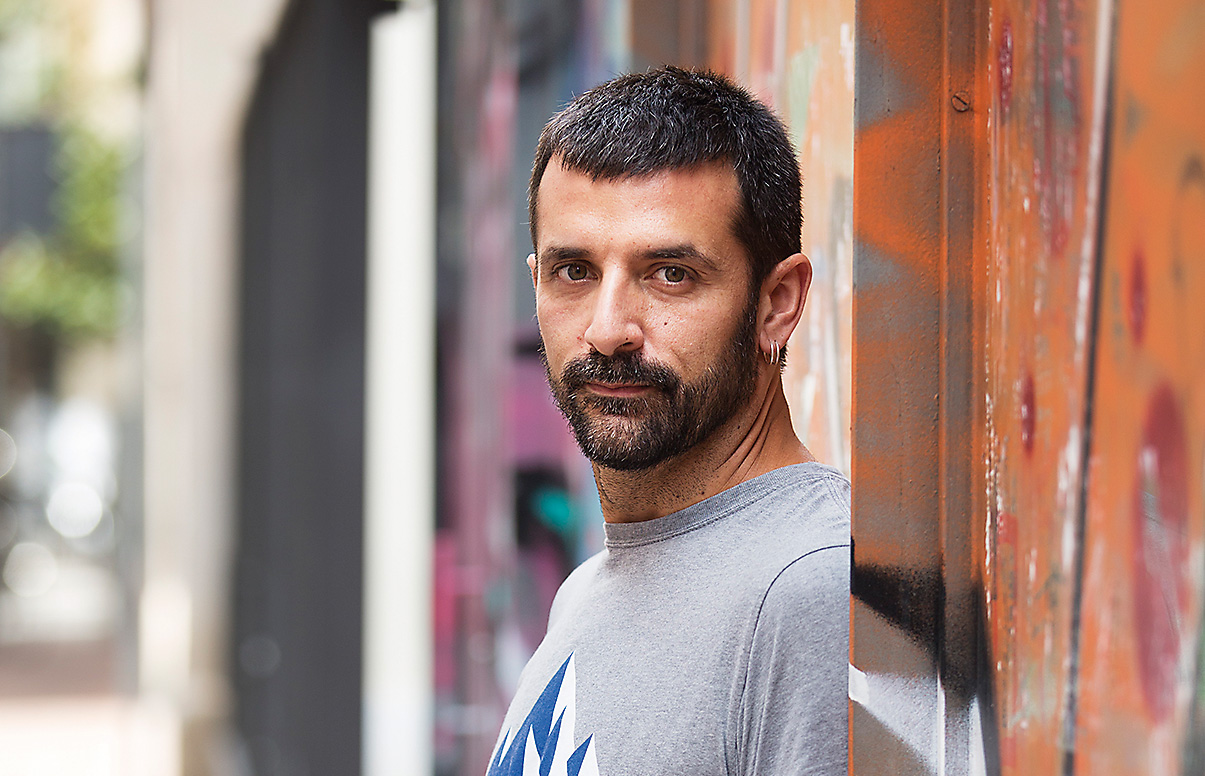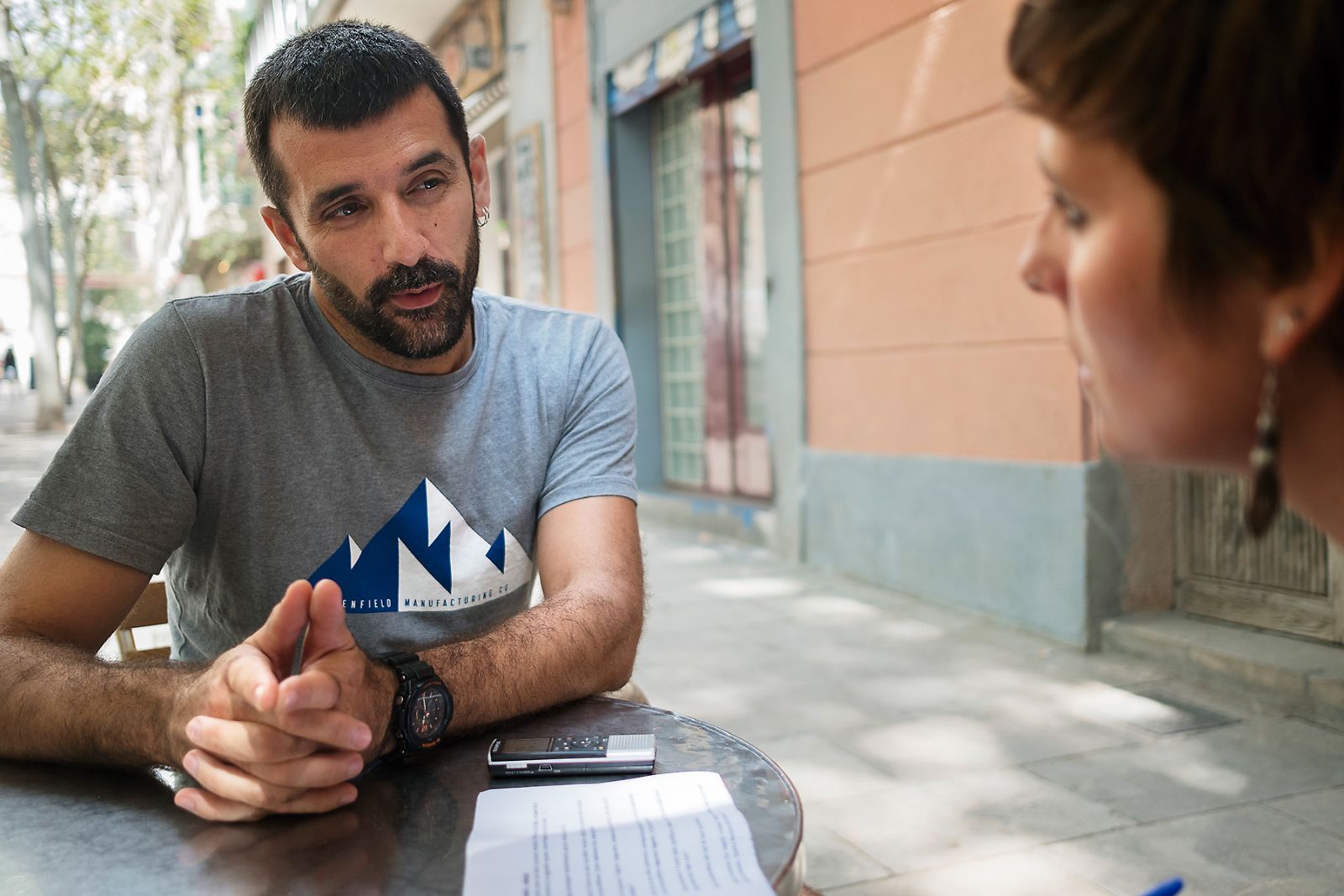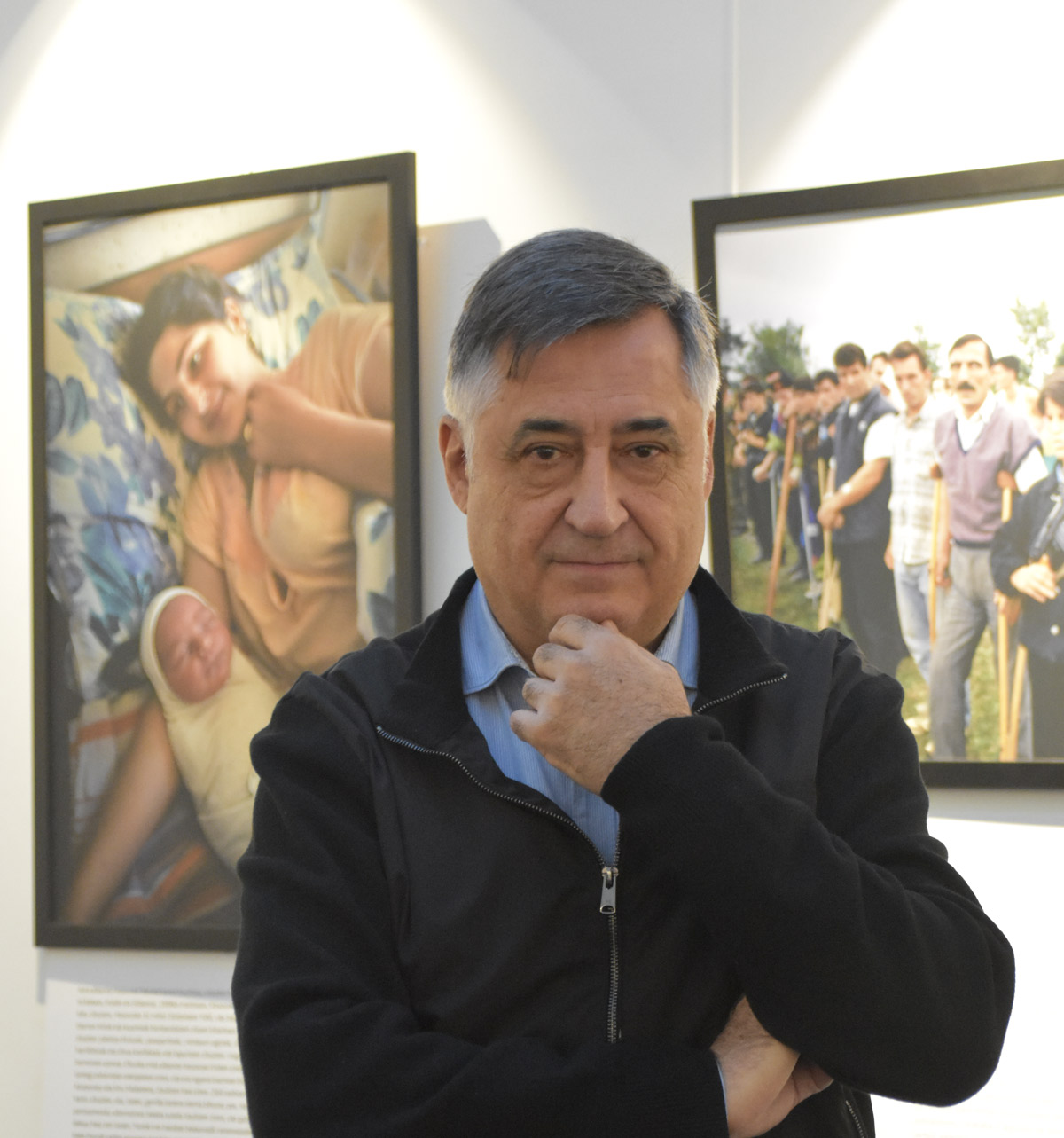"I got into far-right issues knowing I'd be taken for a point of view."
- Photographer and journalist Jordi Borràs (Barcelona, 1981) has turned social protests and demonstrations into workplaces at the height of the photo machine. It started “involuntarily” in illustration studies at the Massana School and has since worked in various media. His work to bring to light the darkest corners of far-right movements has made him a target of threats in recent years. Just on 16 July, when he was about to finish the most frenzied course he had lived as a photographer, an inspector of the National Police attacked him on the street.

How do you feel, after the surprise?
Furious and very angry. Physically better, but in the last month I have not been able to work because I was really hurt by the hit on my ribs. I had trouble breathing and sleeping, and it hasn't been loving.
Beyond the physical consequences, how has the attack affected you?The
July, despite being the most scandalous surprise, unfortunately, is not our first attack. In October, among other things, five years will come from my first death threats report. And over the last five years, I've filed a dozen complaints about it.
The day after the aggression, he learned that the aggressor was not just a police officer, but an inspector of the National Police Information Brigade.
“Viva Franco, viva España” cried a Spanish and Francoist police, what fascinates me most is that I have been attacked with total impunity and without consequences. In fact, for the first time I have realized that following the demonstrations of the extreme right, over and above the difficulties in doing my work freely, I will not be able to go quiet down the street.
What is your case now?
I made a complaint. But for the moment, we can't advance anything new. The course is about to start and we will surely know something in the autumn. Anyone who has been involved in legal proceedings knows that it is going to be a long and exhausting road.

At the moment, the aggressor is working normally in the operation. Will justice be done?
I am attentive and concerned that no action has been taken against the aggressor. Above all, if the facts had happened backwards, and I would have attacked a countryman's police, because I know they would have stopped me the next day. Once again, therefore, the existence of first- and second-class citizens is confirmed. I therefore have little hope in the judicial process. I find it hard to believe in this rule of law. But of course, I'll fight to the end for justice.
In twelve hours, Solidaritzem-collected the EUR 12,000 needed to pay for your defense. Prou impunitat! Projects. What do you think of the answer you received?
It has been terrible to live on the skin the great feeling of solidarity that has flourished in Catalonia in recent years. Yesterday, for example, when I was going to act to present the last book I have published, I stopped at the gas station of a lost people in Catalonia. The employee recognized me, and after checking that I was, he pulled out the portfolio and gave me money to participate in the trial resistance box. Well, this is just one example, but it's terrible: every day there are yellow dinners for prisoners, people send money to deal with trials. Citizenship is doing what it can and more.
In summer, fascist attacks on these ties have intensified. To what extent is society scared?
They want to be scary, but what they're getting is that we all sharpen our teeth. Certainly, these intrantisystem sectors, which have been born against independence, are causing an adverse reaction that makes people increasingly proud to go out into the street. Its greatest success is for the State to bring our struggle to a symbolic level.
But is the symbolic struggle enough to satisfy Catalonia’s desire for freedom?
Not at all. Independence must move forward now, because until we have a short- and medium-term goal, we will be trapped in symbolic struggle. In this sense, the possible scenario for the future that Quim Torra drew last week does not help at all. It is urgent to see what we fail and what we have succeeded in and to design a strategy to meet our goal.
What should be the starting point?
To maintain the model of 1 October: we did a referendum on citizens of many ideologies, because we set aside differences and fought for the same objective. That was the success. Constructive attitude will therefore remain indispensable.
It will soon be a year since the first representatives of the organization were imprisoned. What's the key to going back to normal?
We're not going to get back to normal. The Spanish State will do everything necessary to deal with any kind of action that is considered aggressive and aggressive. It will therefore respond to every attempt at secession with all the means at its disposal, whether legal or illegal. Basically, if we were a democratic country, we could hold a referendum in Scotland or Quebec from the outset. But no, there is an interrogation here, and the police are attacking the civilian population. We live in an unprecedented barbarity.
What does independence need now?The independence
movement has to assume that it has before it a powerful enemy. History has shown that the dirty war has reached places where the state does not arrive, and in Catalonia it has recently been confirmed: computer attacks have been fraudulently used to interrupt the referendum, websites have been closed without a court order, an attempt was made to enter the headquarters of the CUP on September 20… Therefore, it is absurd to play this football game, knowing that the player has the opposite team card.
Do you notice any tiredness among the citizens of
Catalonia?The tiredness yes, but those who expected the independence process to be soufflé have been surprised. Catalan society has been mobilized since the beginning of the consultations in Arenys de Munté in September 2009 and, in these nine long years, the mobilisation has not ceased. It is true that autumn was a turning point, but there is only one look at the results to see that independence is growing. We must not forget that there were more independence votes in the elections imposed on 21 December than in the referendum. In just two months, independence has increased by 5 percent. That's a lot.
Would such an increase be maintained if the elections were organized?
Of course. And not only that, but Ciutadans would lose their Members. In recent months, having competed with the extreme right represented by VOX, many people who voted for them have opened their eyes.
Let's talk about your profession. When and how did you choose to specialize in extreme right-wing movements?
The truth is, it was not an exact decision. I'm an illustrator ex officio, and without wanting to, one day I discovered that this was my trade. It's not an easy job, photojournalism is poorly seen economically. For me, it would be more profitable to photograph weddings, with the utmost respect for photographers who do that work, but that doesn't meet me. I understand photography as a tool for changing society.

Despite the threats and aggressions you have received in this long trajectory, where is the guarantee of freedom of expression?
I immersed myself in the far-right issues knowing that it was going to be complex and that they would take me for a point of view. That does not mean, in itself, that in a country where freedom of expression is defended, there are problems with which, apparently, they are constitutionalists when working with them. But in part, that's the price you have to pay. Last year, I took pictures of two or three acts. For example, in one of them I had to be working for six hours from the window of a home, because I couldn't get down to the street, and in the other two I had to make a couple of complaints about the assaults.
Journalism and photography are essential in the construction of the story. What do you think of the media reports on the Catalan process?
There has been a great difference between radio and public television stations in Spain and Catalonia. You have to look at the round tables of each other. In TV3, for example, they appear in the independence, federalist and obstinate Spanish debates. With TVE1, on the other hand, Spaniards of all colors participate, but that’s it, you’ll never see independentists. In this respect, the data show that the lack of diversity that TV3 wanted to attribute in Spain is absolutely false. But well, when I saw it in January, I was scared that the then Prime Minister, Mariano Rajoy, applauded the work of the media in Spain.
Do you believe that the Catalan media have dealt with the issue in a neutral manner?
Surely, the local media will also have some lack of critical vision, of course. But there are no differences in the dissemination of information. The Spanish media are constantly publishing lies and silencing the facts thanks to the support of the police forces. It is a disgrace. In addition, I find the story they want to create symptomatic: they want to represent the violence and social division that has never existed in independence. On the other hand, it is we who suffer violence and repression, while the structures of the State silence us, despise us and punish us.
Catalonia has lived an unprecedented few days and you have put them together in the book Dies which will last anys.
Yes, that's why, surely, the book has been a great success. We have already published the sixth edition in Catalan and one in Spanish and English. That's the course I've worked on the most. I usually take 60,000 photos a year. Last year, I made 140,000. Every day it was historic and hysterical. There were three or four appointments a day.
The president, Quim Torra, gave a copy to King Philip VI, who was expelled by Philip VI.
It was interesting, especially because they gave me the opportunity to dedicate myself. Don't think about it, I felt a lot of pressure, but I decided that it was best to use that opportunity to convey what he suffered on October 1 and the craving for freedom that Catalonia has. If I am not mistaken, like all the books given to the king, mine will be in the property of the nations... [laughs].
Vietnam, February 7, 1965. The U.S. Air Force first used napalma against the civilian population. It was not the first time that gelatinous gasoline was used. It began to be launched with bombs during World War II and, in Vietnam itself, it was used during the Indochina War in... [+]
It's not a new thing, the world that Homo omen sapiens explodes is getting smaller and smaller. Four holiday and even Scandinavia, thanks to kerosene without taxes. Otherwise, the good Basque will choose exotic places for his holiday. In this magazine, in March, Pello Zubiria... [+]
























